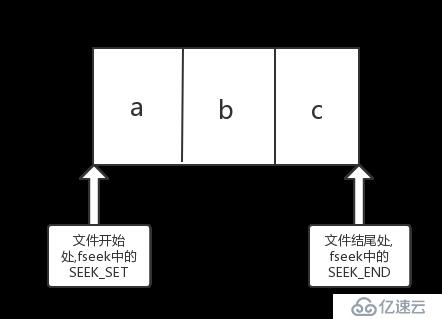c语言中文件的结尾指的是文件的最后一个字符的下一个字符
例如:文件a.txt中有三个字符abc,即文件大小为3
那么文件的实际内容如下图.

echo -n abc > a.txt
#include <stdio.h>
#include <stdlib.h>
int main(void){
FILE* fp = fopen("a.txt","r");
if(NULL==fp){
perror("fopen"),exit(-1);
}
int c;
while(!feof(fp)){ //当文件指针第一次到达文件结尾处时,feof函数返回的是0.
c = getc(fp);
printf("c=%d\n",c);
if(ferror(fp)){
perror("ferror"),exit(-1);
}
}
fclose(fp);
return 0;
}c=97
c=98
c=99
c=-1
所以正确做法应该是
#include <stdio.h>
#include <stdlib.h>
int main(void){
FILE* fp = fopen("a.txt","r");
if(NULL==fp){
perror("fopen"),exit(-1);
}
int c;
while((c=getc(fp))!=EOF){
printf("c=%d\n",c);
if(ferror(fp)){
perror("ferror"),exit(-1);
}
}
return 0;
}c=97
c=98
c=99
如何读出文件最后一个字符c,如下:
#include <stdio.h>
#include <sys/types.h>
#include <fcntl.h>
int main(void){
FILE* fp = fopen("a.txt","r");
fseek(fp,-1,SEEK_END);
char c;
c = getc(fp);
printf("c=%d\n",c);
fseek(fp,0,SEEK_END);
printf("feof(fp)=%d\n",feof(fp));//此时在文件结尾处
//即文件最后一个字符(即c字符)的下一个字符处
//结果为0
c = getc(fp);
printf("c=%d\n",c); //c=-1
printf("feof(fp)=%d\n",feof(fp));//结果为1
return 0;
}c=99
feof(fp)=0
c=-1
feof(fp)=1
亿速云「云服务器」,即开即用、新一代英特尔至强铂金CPU、三副本存储NVMe SSD云盘,价格低至29元/月。点击查看>>
免责声明:本站发布的内容(图片、视频和文字)以原创、转载和分享为主,文章观点不代表本网站立场,如果涉及侵权请联系站长邮箱:is@yisu.com进行举报,并提供相关证据,一经查实,将立刻删除涉嫌侵权内容。